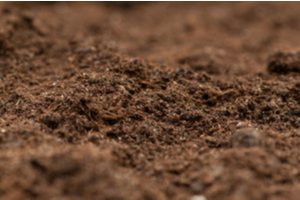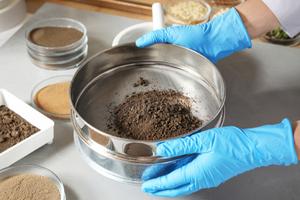With the arrival of warmer weather, many people spend more time on yard work and gardening. After a long winter, new topsoil is often needed for planting, and the first choice many home gardeners need to make is whether they want screened or unscreened topsoil.
Here’s what you need to know about the basics of topsoil and the benefits of using screened soil in home gardens.
What Is Topsoil?
Topsoil is the layer of soil in which nutrients are delivered to plants. As the name implies, it is the uppermost layer, and it is also where sunlight helps the growing process and water is absorbed. This is also where microorganisms can interact with the plant to help it grow and thrive.

Unfortunately, soil that has been used for planting in the past becomes depleted of nutrients over time. This means that it is increasingly difficult to find naturally occurring topsoil, so many people turn to commercially produced soil to ensure a nutrient-dense start for their garden. Topsoil will usually contain a percentage of organic material and is mixed to provide optimum pH levels, evaporation and moisture rates. Topsoil is typically combined with the upper layer of existing soil a few inches deep.
Screened vs. Unscreened Topsoil
Although there are several different types of topsoil to choose from, they all fall into one of two categories: screened topsoil or unscreened topsoil.
Unscreened topsoil is comprised of an inconsistent mixture of smaller and larger particles. It tends to be less expensive because less work is needed to produce it, and it works well for bigger or elevated landscaping features or to serve as a subsoil base that will be later topped using finer soil.
However, it is not suitable for vegetable gardens and flower beds because the bigger particles found within the soil can prevent roots from growing and stop nutrients from making their way to the plant’s roots.
Screen topsoil, in contrast, is soil that has been run through mesh to break it down into particles of more consistent and smaller sizes. Different sizes are available, but the mesh openings are typically around 5/8 or 3/4 of an inch. This filters out rocks, clumps, sticks and other types of matter that is bigger than the size of the screen. This means that, for example, dirt that has been screened to 3/4 of an inch will not contain anything bigger than 3/4 of an inch in diameter.
Because the manufacturing process requires additional steps, screened topsoil can cost slightly more than unscreened soil. However, it is worth the investment because it offers superior growing conditions.
Why Is Screened Soil Ideal?
Here is a look at six benefits of screened topsoil.
Allows Nutrients To Flow More Freely

Screened topsoil’s finer texture makes it easier for nutrients to flow to the plant’s roots, making it ideal for aging gardens where soil has already been used and depleted of nutrients. Soil may become filled with stones and weeds after rotating, and a top layer of screened soil can freshen up the ground by allowing nutrients to reach roots so plants can flourish. In contrast, the alternating small and large particles found in unscreened soil can stifle nutrient supplies.
Facilitates The Flow of Water
Screened topsoil tends to be loose and very uniform in size, which means it can provide excellent drainage properties. Gardens that experience drainage problems, particularly those with clay-type soils, can benefit from screened soil.
With unscreened topsoil, water may become trapped between the differently shaped particles, which can lead to problems such as root rot and other types of plant damage.
More Uniform Consistency
Because the screening process shakes up the soil significantly, most of the materials will be blended well, which means the soil will be easier to amend uniformly with compost, lime or other amendments.
Easier To Manipulate
Screen topsoil tends to be looser and softer than unscreened topsoil, which means that it is easier to manipulate. This makes it a smart choice for applying across a series of smaller spaces such as garden beds.
Doesn’t Contain Debris
The screening process removes unnecessary debris from soil, including the types of larger rocks that can pose problems when gardening and damage gardening tools. This also makes it ideal for installing sod as it will be easier to rake and grade smoothly, resulting in a more evenly installed lawn.
Can Encourage Greater Yields
Thoroughly tilling topsoil into existing soil can promote deeper root growth. Because screened topsoil gives roots plenty of room to grow, fruit trees and other bigger plants will have a better chance of growing tall and producing plenty of fruit.
Can You Screen Your Own Topsoil?

Home gardeners can screen their own topsoil with a mesh screening dish, but this is only a practical option if very small volumes of topsoil are involved. Place the topsoil in the dish, position a wheelbarrow beneath it to catch the screened soil, and shake the screening dish until all of the soil has sieved through it. The rocks and clumps will remain in the dish and all of the screened topsoil will be in the wheelbarrow ready for planting. However, those that need finer topsoil can then screen the soil a second time using a dish with smaller gaps.
Applying Screened Topsoil
Screened soil may cost slightly more than unscreened soil, but purchasing it in bulk can be more economical. Some screened topsoils may come with compost already incorporated for further cost savings.
Topsoil that is purchased in smaller containers can be poured directly over the area to be planted, or it can be applied using a shovel and then leveled with a rake or broom. The top of the soil should be sprayed down lightly with water to help it stay in place.
Reach Out To Dirt Connections
For screened dirt of all sizes for your gardening projects, reach out to the soil professionals at Dirt Connections. We deliver high-quality soil and dirt to residential and commercial sites throughout Northern Virginia and can advise on the right materials for your project.
Summary

Dirt Connections was started with one goal in mind: providing quality residential and commercial construction services to clients on time and on budget. Reach out for more information on how we can support your next project.
For your convenience our estimates are free and by appointment. Call 703-940-9949 for a free estimate today!









































